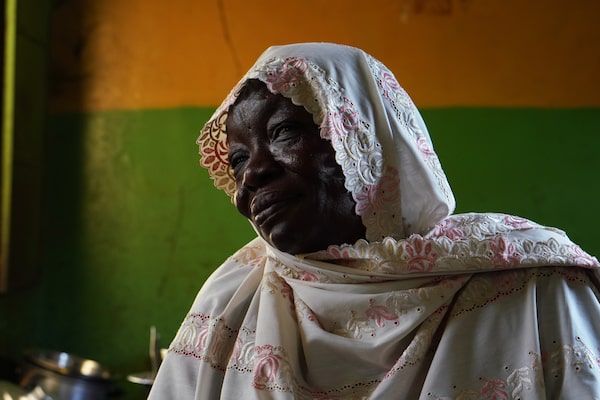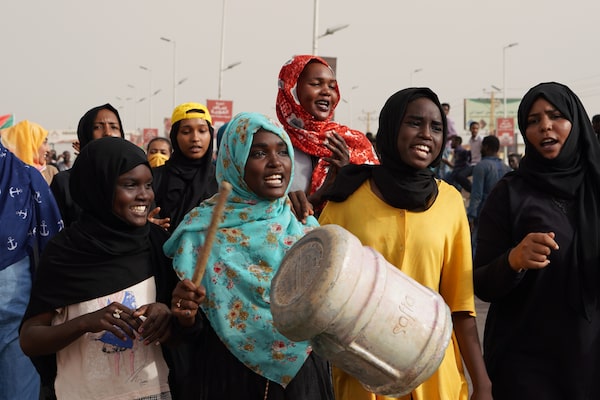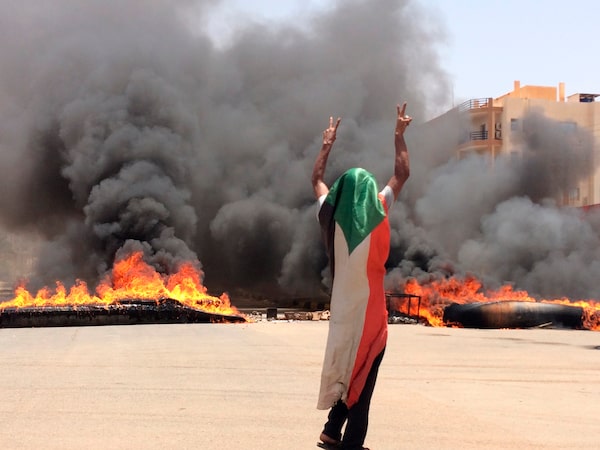
A woman prepares tea in the kitchen of a tea-sellers' union in Khartoum. The streets of the Sudanese capital are home to thousands of tea sellers, most earning only two or three dollars a day.Andreea Campeanu/The Globe and Mail
Every day, the tea sellers search for their missing comrades. They trudge to hospitals, morgues and police stations, hunting for clues to the fate of the six women who disappeared when Sudan’s security forces launched a deadly assault on a pro-democracy protest camp last month.
When a body was found floating in the Nile, they thought it might be one of the missing tea sellers. It was not. The search continued.
The tea women, who number in the thousands on Khartoum’s busy commercial streets, have always been one of the most vulnerable groups in the city. They are often harassed and punished by police, even though they earn only two or three dollars a day for brewing glasses of sweet, fragrant tea at their tiny stalls on the dusty margins of the streets.
But when they decided to support the street protests against Sudan’s military rulers this year, they were exposed to greater dangers than ever before – and some may have paid with their lives.
For six weeks, the tea sellers had volunteered to run the biggest kitchen at Khartoum’s main protest camp. Every day they prepared meals in 31 huge cooking pots, providing more than 1,000 plates of food and 5,000 pieces of bread for the thousands of protesters.
When the police and paramilitary forces launched a brutal attack on the protest camp in the predawn hours on June 3, the women faced the same gunfire that killed more than 100 of the protesters.

Awadeya Mahmoud Koko is leader of a co-operative of Sudanese tea sellers.Andreea Campeanu/The Globe and Mail
For decades, under Sudan’s authoritarian regimes, the tea sellers have endured harsh treatment from security forces. Many of the vendors are migrants, and most are so impoverished that they do not even own their tea glasses or food equipment. (They usually pay a rental fee to the owners.) The police see them as an embarrassment, a sign of the country’s growing poverty and disorder.
“They never left us in peace,” said Awadeya Mahmoud Koko, leader of a co-operative that represents about 27,000 tea vendors and other food workers in the Khartoum area. “They confiscate our belongings and take them to the police station, they make us pay a fine and then a week later they do it again. It’s because we’re not socially acceptable. They don’t want to see us on the streets.”
Ms. Koko, a 56-year-old migrant from the South Kordofan region, became a tea seller in Khartoum in 1986. Four years later, she formed a co-operative of tea and food sellers, aiming to provide legal aid and other assistance to those who were arrested. And she became an activist herself, willing to confront the government on a range of issues.
In 2006, after incurring debts that she could not pay, she was imprisoned under laws that allow Sudan to jail debtors. She spent four years in prison. When she was released, she continued to agitate for the rights of the tea sellers, while working on programs to provide vocational skills for their children.

Sudanese women protest in Khartoum on June 30, demanding a civilian government.Andreea Campeanu/The Globe and Mail
Under the 30-year rule of President Omar al-Bashir, the country slid into economic collapse and political repression, and a wave of street protests began last December.
In April, after four months of marches, the protesters achieved a remarkable victory: forcing the ouster of Mr. al-Bashir.
The massive demonstrations triggered such political unrest that it led to a military coup and the president’s arrest.
The protesters, demanding a civilian government, vowed to continue their round-the-clock camp outside the headquarters of Sudan’s armed forces. And the tea sellers decided to help them, bringing a daily supply of tea, coffee and food.
“The people at the sit-in were like our children,” Ms. Koko told The Globe and Mail in an interview. “We had suffered severely under the last regime, and we had hopes for change.”

On June 3, a protester flashes the victory sign at burning tires and debris near Khartoum's army headquarters.The Associated Press
The protest camp was putting huge pressure on Sudan’s new military regime, and there were growing signs of a looming attack, but the protesters were determined to stay. Then, in the darkness of the early morning hours on June 3, the police and paramilitary forces launched a massive assault with guns, tear gas and wooden clubs.
Accounts from witnesses are horrific. Protesters tried to form a human shield around their camp, but they were gunned down, and the rest fled. “It was a stampede,” said Saif Ahmed, a 24-year-old protester who heard bullets flying past him. One protester told him: “Now our revolution begins.” Moments later, the man was shot and fell to the ground. “Ten thousand people were running,” Mr. Ahmed said. “You were stepping over other people. I kept looking back and seeing people falling. I felt numb. I had given up. I was saying my prayers as I ran.”
He managed to escape, but many did not. Some protesters were rounded up and marched toward the Nile, where dozens of bodies were later found. Many women, including tea sellers, were beaten or raped. More than 100 people were killed and more than 700 were injured.
Ms. Koko had left the protest camp at about 3:30 a.m. that night, just shortly before the assault began. “I was lucky I made it out,” she said. When she returned to the site later, she discovered that the security forces had burned the protest camp to the ground. Her volunteer kitchen was gone. “I lost everything,” she said. “Everything was stolen from us, down to the last spoon.”
The fate of the six missing tea sellers is still unknown. “Their families are still hoping that they’re alive,” Ms. Koko said. “They don’t want to believe they’re dead.”
Khartoum’s tea sellers have always been vulnerable to attack, she said. “But it was never this bad.”

'I lost everything,' Ms. Koko says of the June 3 crackdown on the Khartoum protest camp where her volunteer kitchen was based. 'Everything was stolen from us, down to the last spoon.'Andreea Campeanu/The Globe and Mail
Our Morning Update and Evening Update newsletters are written by Globe editors, giving you a concise summary of the day’s most important headlines. Sign up today.
 Geoffrey York
Geoffrey York